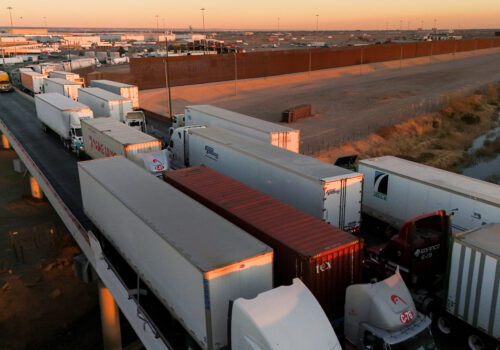Tariffs on Mexico could threaten Texas’s electricity reliability
Import taxes on Mexico risk planting the seeds for another serious power crisis in Texas. US tariffs, slated to take force on March 4, could limit access to essential electrical components, making it more difficult for Texas to construct the resilient power grid it needs.
Take transformers, which are used to step up generation voltage for long-distance transmission, or step down voltage for distribution. There is a nationwide—and global—shortage of transformers, as lead times have surged from fifty weeks in 2021 to 120 weeks in early 2024. But US production of transformers meets only 20 percent of domestic demand.
Before US President Donald Trump paused Mexico-related tariffs on February 4, Mexican-produced transformers—and other electrical components—were on the list of imports that were going to be slammed by a 25 percent tariff, which would have significantly impacted new electricity generation and transmission.
Tariffs could theoretically push prices of finished goods above 25 percent due to “pancaking” taxes on cross-border shipments of intermediate goods, where each border crossing incurs a fee. Furthermore, across-the-board 25 percent tariffs on steel and aluminum will raise prices of a specialized steel product called grain-oriented electrical steel, which is used in transformers, elevating the price of transformers made in the United States.
Higher prices for transformers, especially transformers imported from Mexico, because of tariffs will raise project-development costs and delay infrastructure upgrades, hitting Texas hardest. As the top US importer of transformer units, Texas relies heavily on Mexico, which supplies nearly half of all high-voltage transformer imports through the Laredo Census District. Not all of these transformers are ultimately installed in Texas, of course—but many are.
Consequently, tariffs on Mexican transformers are bad for attracting business to Texas, bad for consumers, and bad for the energy sector.
In a worst-case scenario, the tariffs are planting the seeds of another calamitous—and potentially deadly—electricity outage.
That’s a big problem. The Electric Reliability Council of Texas (ERCOT) has only avoided a repeat of the Winter Storm Uri disaster in 2021 thanks to greater electricity generation, which rose by 70 terawatt hours (TWh) from 2021 to 2024 even as coal use declined. Advanced energy technologies—such as solar, wind, and battery energy storage systems—accounted for 91 percent of new electricity generation capacity from March 2021 to December 2024, although ERCOT’s natural gas generation rose significantly.
Solar electricity (plus storage) has been especially valuable for ERCOT’s grid stability. Solar generation tends to be correlated with hot summer days, improving reliability of the grid during sweltering summers. Indeed, solar and battery capacity reduced ERCOT wholesale electricity prices during summer demand from $332 per megawatt hour (MWh) in 2023 to $80 per MWh in 2024.
Texas has big plans to double power generation by 2030. A transformers shortage, exacerbated by new tariffs, may prevent Texas from building out the electricity generation it needs.
If Texas is unable to construct new incremental electricity generation—particularly for peak summer demand—Houston and the entire state could be plunged into crisis after crisis. Unreliable power is sure to drive away businesses.
Data centers require uninterruptible power supplies, so any outages in the Lone Star State—or even the credible threat of outages—will render it less attractive to artificial intelligence and technology companies. Manufacturers, aware that Texas’s electricity outage in 2021 caused severe supply-chain disruptions to chip production, will look to other locations if ERCOT’s reliability is in question.
Moreover, any unreliability on the Texas grid could have both national and global energy security implications.
Disruptions to the Texas electricity grid harm oil and gas production and constrain natural gas pipeline shipments to liquefied natural gas (LNG) terminals, including to Freeport LNG, which is notably grid-connected. The last thing LNG developers looking for new long-term contracts need is another headwind, in addition to the threat of tariffs and hurricanes.
Relatedly, any shortage of transformers and other electrical components will make it much harder to recover from storms. In summer 2024, millions of individuals in Houston went days without power due to Hurricane Beryl, which did not even directly impact the city. Future outages could be much worse if transformers and other electrical components are subject to artificial scarcity from tariffs.
With power demand and new generation requirements on the rise, Texas does not need a tax that drives up the cost of the buildout, weakens the resilience of the grid, and poses reliability risks to the oil and gas industry. Tariffs on transformers and other electrical components will make it considerably harder for the United States to achieve energy dominance and could prove costly for Texas.
David Goldwyn is president of Goldwyn Global Strategies, LLC, chairman of the Atlantic Council Global Energy Center’s Energy Advisory Group, and the former special envoy and coordinator for international energy affairs at the US State Department.
Joseph Webster is a senior fellow at the Atlantic Council. This article reflects their own personal opinions.
Further reading
Sat, Feb 1, 2025
Experts react: Trump just slapped tariffs on Mexico, Canada, and China. What’s next?
New Atlanticist By
Our experts explain the economic and geopolitical implications of the US tariffs on Mexico, Canada, and China.
Sat, Feb 1, 2025
What to know about Trump’s new tariffs
Fast Thinking By
Our experts outline the economic and political impacts that the United States’ tariffs will have on Canada, Mexico, and China.
Thu, Jan 30, 2025
Tariffs on Canada and Mexico could hurt Trump’s quest for US energy dominance
New Atlanticist By David L. Goldwyn, Joseph Webster
A trade war against Canada and Mexico could affect US energy prices and have significant geopolitical ramifications.
Image: A general view of electric lines as demand for power surges during a period of hot weather in Houston, Texas, U.S. June 27, 2023. REUTERS/Callaghan O’Hare


